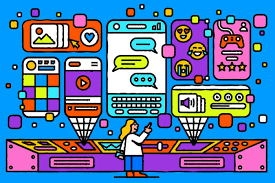M5D2 Blog#4:Conducting Research on New literacies
Jilly Woodhouse
CURI-6010-B02: New Media and New Literacies
M5D2: Blog #4: Conducting Research on New literacies
Consider what topic you are planning to research for your final project.
New Media Literacies in Science classroom.
How does the integration of new media literacies in science classrooms affect students' scientific reasoning skills and success in science?
Discuss what topic interests you most and why, and what some practical applications of delving in depth in this topic could be for your work as an educator.
As a science teacher, the topic of New Media Literacies in the Science Classroom is of great interest to me because it aligns with how today’s students learn and interact with the world. In a digital age where information is abundant and constantly evolving, integrating new media tools such as simulations, educational videos, podcasts, and interactive platforms can significantly enhance student engagement and understanding of complex scientific concepts. These tools support inquiry-based learning and help students develop essential 21st-century skills, including critical thinking, digital communication, and the ability to evaluate the credibility of scientific information. Moreover, teaching with new media promotes student-centered learning and empowers learners to navigate and contribute to the digital world responsibly. As an educator, staying informed about and incorporating new media literacies not only improves my teaching practice but also prepares my students to be scientifically literate and digitally competent citizens.
Peer Review Article Annotations
The Effect of Blended Learning and Social Media-Supported Learning on the Students’ Attitude and Self-Directed Learning Skills in Science Education.
The article "The Effect of Blended Learning and Social Media-Supported Learning on the Students' Attitude and Self-Directed Learning Skills in Science Education" (Akgunduz & Akinoglu, 2016). explores how different instructional approaches affect middle school students' engagement and autonomy in science learning. The study compared traditional instruction with two experimental methods: blended learning (a mix of online and face-to-face instruction) and social media-supported learning. Results showed that blended learning significantly improved students' attitudes toward science and their self-directed learning skills, likely due to its structured and resource-rich environment. Social media-supported learning also had a positive, though less significant impact suggesting that while platforms like Edmodo can support learning, their effectiveness depends on how well they are organized. The study concludes that blended learning offers clear benefits for fostering student motivation and independence in science education, whereas social media tools must be carefully managed to avoid distractions and maximize educational value.
Exploring the Use of Social Media in Science Learning Environments: A Systematic Literature Review.
The article "Exploring the Use of Social Media in Science Learning Environments: A Systematic Literature Review" by Ningtyas, Widarti, and Parlan (2024) examines the integration of social media platforms such as Facebook, Instagram, YouTube, Twitter, and WhatsApp into science education. The findings indicate that social media can enhance science learning by improving visualization of abstract concepts, fostering collaboration, and increasing student motivation. However, the study also highlights potential drawbacks, including privacy concerns and the need for institutional training to optimize the use of these platforms in educational settings.
Digital technology supports science education for students with disabilities: A systematic review
The article "Digital Technology Supports Science Education for Students with Disabilities: A Systematic Review" by Mikropoulos and Iatraki (2023) explored how digital technologies impact science education for students with disabilities. The article finds that digital tools can significantly enhance student motivation, engagement, and participation when thoughtfully integrated into the curriculum. However, their effectiveness largely depends on how well they are tailored to students’ individual needs and the context in which they are used. The authors emphasize the importance of accessible and adaptable technologies, as well as the need for teacher training and supportive educational policies. While the research highlights the positive potential of digital tools, it also calls for more diverse and up-to-date research to fully understand their role in inclusive science education.
Practicality of the interactive multimedia development integrated science with inquiry based learning model of simple machine themes on human muscular and skeleton system integrated 21st century learning.
The article titled "Practically of the Interactive Multimedia Development Integrated Science with Inquiry-Based Learning Model of Simple Machine Themes on Human Muscular and Skeleton System Integrated 21st Century Learning" focuses on the development and implementation of interactive multimedia tools designed to enhance science education. Specifically, it addresses the integration of inquiry-based learning models with interactive multimedia to teach concepts related to simple machines, particularly focusing on the human muscular and skeletal systems. The study emphasizes the importance of aligning these educational tools with 21st-century learning skills, aiming to foster critical thinking, problem-solving, and collaborative skills among students. By incorporating interactive elements, the approach seeks to engage students actively in the learning process, making complex scientific concepts more accessible and comprehensible. The research highlights the practical applications of such multimedia tools in educational settings, demonstrating their potential to improve student understanding and interest in science subjects.
5. Start with Wonder, Then Add Inquiry: Developing Young Children's Media Literacy Competencies.
The article "Start with Wonder, Then Add Inquiry: Developing Young Children’s Media Literacy Competencies" by Faith Rogow (2022), emphasizes the importance of fostering media literacy in early childhood education. Rogow outlines ten key competencies that young children should develop to navigate the media-rich world thoughtfully and critically. These competencies include skills such as accessing media, acting on media messages, attending to media content, connecting and collaborating through media, comprehending media messages, communicating and creating with media, engaging and exploring media, evaluating media, inquiring into media messages, and reflecting on media's impact. The article advocates for an inquiry-based approach to teaching media literacy, encouraging educators to start with children's natural sense of wonder and guide them through the process of questioning and exploring media content. By integrating these competencies into early learning experiences, educators can help children develop the critical thinking skills necessary to engage with media in a meaningful and responsible way.
References
Akgunduz, D., & Akinoglu, O. (2016). The effect of blended learning and social media-supported learning on the students’ attitude and self-directed learning skills in science education. TOJET : The Turkish Online Journal of Educational Technology, 15(2). https://www.proquest.com/docview/1807692536?parentSessionId=qmT7gX2J02%2BFnG119%2BITTRKztNyqXgTSNtw1tDGbaCw%3D&pq-origsite=primo&sourcetype=Scholarly%20Journals
Kusuma Ningtyas, P., Widarti, H., & Parlan, P. (2024). Exploring the use of social media in science learning environments: A systematic literature review. J.Sci.Learn.2024, 7(2), 178–186. https://doi.org/10.17509/jsl.v7i2.67071
Mikropoulos, T. A., & Iatraki, G. (2023). Digital technology supports science education for students with disabilities: A systematic review. Education and Information Technologies, 28(4), 3911–3935. https://doi.org/10.1007/s10639-022-11317-9
Nurhafifah, Ratnawulan, & Ahmad Fauzi. (2021). Practicality of the interactive multimedia development integrated science with inquiry based learning model of simple machine themes on human muscular and skeleton system integrated 21st century learning. Journal of Physics. Conference Series, 1876(1). https://doi.org/10.1088/1742-6596/1876/1/012053
Rogow, F. (2022). Start with wonder, then add inquiry: developing young children's media literacy competencies. Teaching Young Children, 15(2), 16-19. https://sunyempire.idm.oclc.org/login?qurl=https%3A%2F%2Fwww.proquest.com%2Ftrade-journals%2Fstart-with-wonder-then-add-inquiry-developing%2Fdocview%2F2768531637%2Fse-2%3Faccountid%3D8067


Comments
Post a Comment